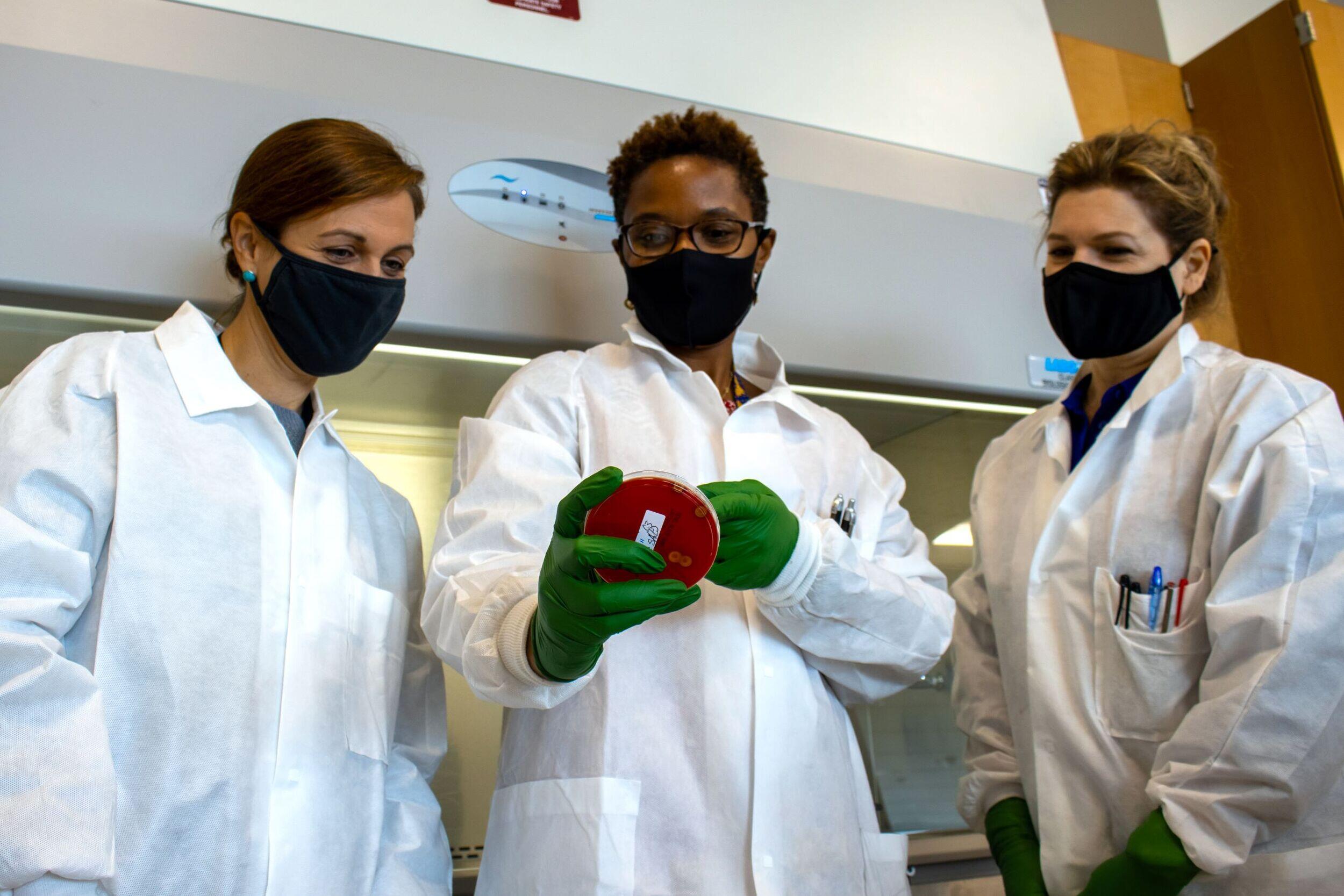
Oct. 20, 2021
Antimicrobial wipes in health care: How effective are they?
Share this story
For years, health care workers in clinical settings and the educational health care environment have used germicidal or antimicrobial wipes as part of a common practice in sanitizing medical devices, surfaces and other equipment.
The advent of COVID-19 further underscored the importance of effectively cleaning surfaces to prevent the spread of infections.
But how effective are antimicrobial wipes and do they eliminate disease-causing bacteria?
A team of Virginia Commonwealth University researchers, led by co-principal investigators Jenica L. Harrison, Ph.D., and Melissa Jamerson, Ph.D., is evaluating the efficacy of PDI Super Sani-Cloth and PDI Sani-Cloth AF3 germicidal disposable wipes to decontaminate lead aprons used in the radiology department at VCU Health, as well as Apple iPad tablet cases used by medical laboratory sciences students during class sessions and clinical rotations in the hospital.
The first part of the study evaluates the current lead asset decontamination protocol used in three VCU Health interventional imaging clinical environments.
According to Jamerson, the team collected samples in three separate areas: a designated area in the operating room, in interventional radiology at the main hospital, and at the VCU Baird Vascular Institute – an outpatient setting. The researchers collected samples before and after cleaning with the PDI Super Sani-Cloth wipes to determine whether they effectively clean the lead assets.
“One of the reasons VCU Health asked us to look at the three different areas is because the cleaning schedules are different,” said Jamerson, an assistant professor in the Department of Medical Laboratory Sciences in the VCU College of Health Professions. “In the operating room, they clean more frequently than they do at the outpatient setting, and so they wanted to see if there was a difference due to the amount of cleaning that they do. This is part of the data that we're looking at, and whether we see an increase in bacterial contamination when they're not cleaned as frequently.”
The other part of the study examines the current decontamination protocol in the Department of Medical Laboratory Sciences to reduce the risk of bacteria on mobile device cases after routine use within the student medical laboratory setting.
“Even though our students are using devices in clinical rotations and we have been using wipes to disinfect the cases within the laboratory environment, the question always is about biohazard safety,” said Harrison, an associate professor in the Department of Medical Laboratory Sciences. “This is all about patient safety, and having protocols in place that would help to reduce hospital-acquired infections. We don’t want people to come in the hospital and get sick. And with our students, we want to make sure that they're safe with the educational tools that we give them.”
According to the Centers for Disease Control and Prevention, on any given day about 1 in 31 hospital patients has at least one health care-associated infection. Additionally, the American Society for Microbiology Guidelines for Biosafety in Teaching Laboratories indicate that in medical laboratory science programs, educators must use best practices to minimize risk of biohazard contamination to students. Proper decontamination procedures are critical to eliminate microbial contamination on medical devices and personal protective equipment as well as mobile devices.
Sonya Echols, Ph.D., an affiliate associate professor in the VCU School of Medicine’s Department of Radiology; Teresa S. Nadder, Ph.D., an associate professor and chair of the Department of Medical Laboratory Sciences; and Lisa Perkins of the Department of Medical Laboratory Sciences collaborated on this study.
“We want to be able to educate individuals about the impact this has on patient safety and why this is so important,” Jamerson said.
Results from the study will inform best practices for decontamination of lead assets and mobile devices that can be disseminated throughout VCU, VCU Health and to other health care professional organizations. The group plans to present their findings at the Clinical Laboratory Educators Conference, the American Society for Clinical Laboratory Science annual conference and the Association of Schools Advancing Health Professions annual conference in 2022.
Subscribe to VCU News
Subscribe to VCU News at newsletter.vcu.edu and receive a selection of stories, videos, photos, news clips and event listings in your inbox.







